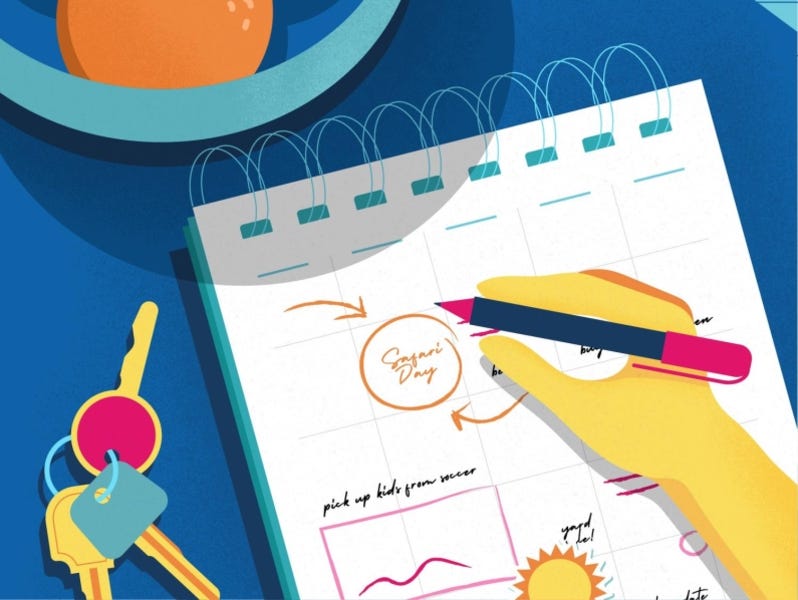Dear Friend,
You know the year has truly gone by when the planner emails start arriving. Crush your goals for 2022! they scream. And god knows I want to - just like I wanted to crush my goals for 2021. And while the jury’s still out on whether or not I crushed anything apart from peanuts and whatever little optimism I’ve had for humanity at large - my beautiful, fancy, gorgeously illustrated and hideously expensive 2021 planner remains largely untouched.
Planners and Precommitment
I buy an expensive planner with the hope that I’ll finally be the organized #boss that I’ve always wanted to be. I believed that I’d somehow stay on course - even when my motivations weren’t built on strong foundations - because I’d forked out a large sum of money.
Behavioural economists call this surge of money-fuelled optimism, “precommitment”. It’s when a person spends a greater sum of money than usual on something they’re not fully committed to, in the hope that the large sum of money they just spent would force their future self to stick.
One of the most popular examples of precommitment is paying annual gym fees (#relatable) at the start of every year with the hope that this will be the year you’re finally going to be the most ripped version of yourself. This behaviour is so ubiquitous, that economists at Berkeley actually did a study where they discovered that members with an annual pass actually paid more per class than those who opted for a monthly pass, i.e - they attended way fewer classes than those with a monthly pass. Another study discovered that pre-committing is the least effective nudge to behavioural change.
Whether it’s becoming organized or getting fit - the most powerful motivations are internal, not external.
Making Precommitment Work
This isn’t to say that making a commitment is a bad thing. It’s just that behaviours are hard to change. I did some digging to learn what leading behavioural economists recommend to make things work. Here’s what I’ve learned:
Commit for your present self - The problem with precommitment is that we assume that our future self will be in the same state of mind and will have the same circumstances as our present self. As a result, we overestimate both our motivations as well as capabilities and end up spending on things/services we might not be able to stick to. Start simply - planner printouts instead of planners. A monthly gym membership instead of an annual one. Set yourself up for success by starting slow. This will help you gauge yourself and allow for better decision-making in the future.
Make it easy to show up - James Clear calls this step, “make it obvious”. One of the ways I’ve found it easy to show up for anything fitness related (something I’ve finally wrestled into a habit this year) is to sign up for instructor-led classes where you don’t have to figure out what to do. You just show up. Clear recommends keeping what you want to master - in this case - the planner - front and centre on your desk, versus hiding it in a draw where it’s easy to ignore.
Stick to one system - If you’re learning/trying something new, stick to one system. When you try to juggle between planners, notebooks, calendars and apps - things get confusing! I’ve often gotten so carried away with all the productivity tools out there that I download everything…but use nothing. Experts recommend sticking to one system, mastering the system and then adding new systems as we grow & get comfortable.
Reward yourself along the way - Behavioural economists state that humans are hardwired for instant gratification. Our instinct is to seize what’s at hand than to wait. So perhaps it’s possible to optimise for this. Instead of giving yourself one big reward right at the start - you can have smaller rewards along the way. Filling out a notebook for a month: new pens. Completing a notebook: newer, fancier notebook. While having a vision is important, it might be more helpful if we didn’t look too far ahead.
Every day is a good day - You can get your fresh start, today. It’s a brand new week after all. Every day is a good day when it comes to creating new habits!
Don’t mistake the car for the driver
We’re constantly told stuff like “There is no more profitable investment than investing in yourself.” Like, spending money on self-improvement is exhilarating. A step towards the new you! But the danger of precommitment, economists say, is that we often falsely believe that the very act of spending money on self-improvement will propel said improvement. It won’t. Cars can get you from point A to point B quite easily, but if you can’t drive them - they’re just metal.
Money is the car, but you are the driver.
I hope you found this useful. If you think you know someone who might enjoy reading this newsletter, do forward this email to them.




